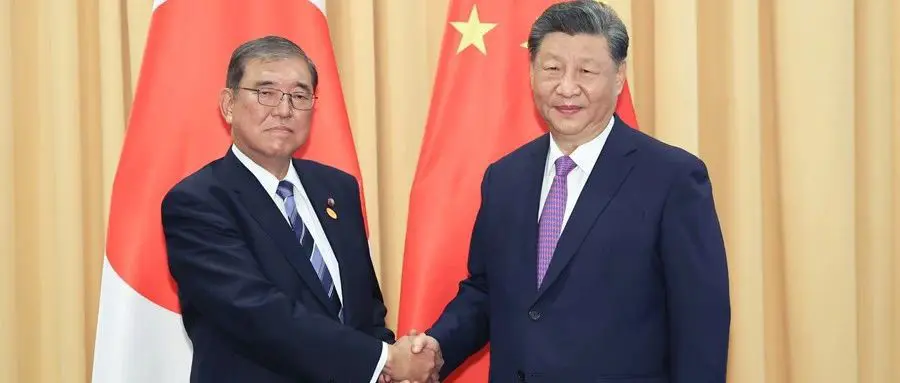Xi Jinping meets with Japanese Prime Minister Shigeru Ishiba

On the afternoon of the month, local time, President Xi Jinping met with Japanese Prime Minister Shigeru Ishiba during his attendance at the APEC Economic Leaders' Meeting in Lima.
Xi Jinping pointed out that at present, the international and regional situation is intertwined with changes and turmoil, and the relationship between China and Japan is at a critical period of improvement and development. China and Japan are close neighbors, both being important countries in Asia and the world, and the bilateral relationship holds significance beyond the bilateral level. The Chinese side is willing to work together with the Japanese side to adhere to the principles and direction established by the four political documents between China and Japan, uphold the important consensus that "China and Japan are partners and do not pose threats to each other," and make joint efforts to comprehensively advance the strategic and mutually beneficial relationship between China and Japan, aiming to build a constructive and stable China-Japan relationship that aligns with the requirements of the new era.
Xi Jinping emphasized that China's development is an opportunity for the world, and this is especially true for neighboring countries like Japan. He hopes that Japan will work with China to establish correct mutual perceptions, grasp the correct direction of bilateral relations from a strategic and holistic perspective, and reflect the important political consensus reached by both sides into specific policies and actions. Japan should face history squarely and look to the future, properly handle major principled issues such as history and Taiwan, constructively manage differences, and safeguard the political foundation of bilateral relations. Both sides should deepen and expand exchanges in the fields of culture, people-to-people, and local interactions to promote mutual understanding between the peoples of China and Japan, particularly among the younger generations. The economic interests and industrial supply chains of China and Japan are deeply intertwined; both sides should adhere to a win-win approach to cooperation, safeguard the global free trade system, and ensure the stability and smooth operation of the supply chain. They should enhance collaboration on international and regional affairs, practice true multilateralism, promote open regionalism, and jointly address global challenges.
Ishiba Shigeru stated that Japan and China bear the responsibility for regional peace and prosperity. Both sides working together to comprehensively advance the Japan-China strategic and mutually beneficial relationship and to build a constructive and stable Japan-China relationship is of great significance to the region and the world. On the Taiwan issue, Japan's position as stated in the Japan-China Joint Statement of 1972 remains unchanged. Japan adheres to the principles and consensus established in the four political documents between Japan and China, remains committed to the path of peaceful development, and is willing to engage in sincere dialogue with China at all levels, based on the spirit of facing history and looking to the future, to enhance mutual understanding and trust. The potential for economic cooperation between Japan and China is enormous, and Japan has no intention of decoupling or disrupting supply chains with China. It hopes to strengthen cultural exchanges and promote more achievements in cooperation in various fields such as trade, green development, and medical care, better benefiting the peoples of both countries. Japan is willing to closely cooperate with China within frameworks such as the Asia-Pacific Economic Cooperation (APEC).
Both sides agreed to maintain high-level exchanges, fully utilize high-level dialogue mechanisms in the fields of economy and culture, and swiftly translate the consensus reached on the issue of Japan's Fukushima nuclear-contaminated water discharge into action.
Cai Qi, Wang Yi and others attended the meeting.

